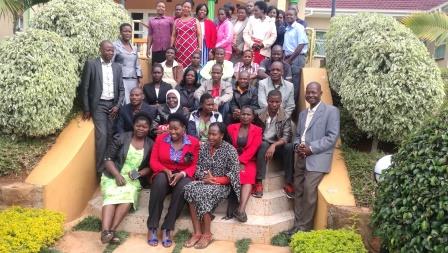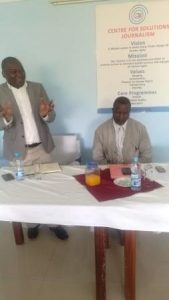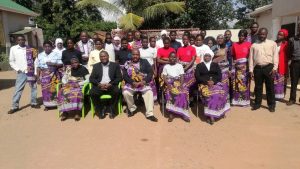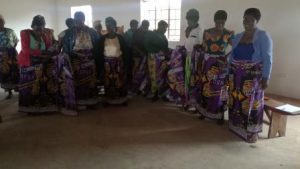
Calls to enact the proposed Termination of Pregnancy Bill in Malawi are mounting amidst an increase in deaths resulting from backstreet abortions.
Group Headwoman Saiti of Zomba told a meeting at the weekend organised by Centre for Solutions Journalism that it was impossible to keep quiet when women and girls continue to die from unsafe abortions.
“The draft Termination of Pregnancy Bill needs to be tabled in Parliament and get enacted as quickly as possible. We can longer continue lying that girls are dying from miscarriages when in fact they are dying from unsafe abortions,” she said at the meeting.
Centre for Solutions Journalism (CSJ) is sensitising sexual and reproductive health activists from the rural areas about abortion law reforms.
According to Group Village Headwoman Saiti, it was a pity that most opponents of abortion law reform are urbanites who do not know reproductive health challenges, which women in rural areas face.
Speaking during the training, CSJ executive director Brian Ligomeka said abortion law reform was progressing at a very slow pace explaining that the Law Commission already gazetted a report which has a draft law.
He said after the report was gazetted the next step was for Cabinet to discuss its contents, have its input and then adopt it as a government bill to be tabled in Parliament.
“I share your frustrations. There is something terribly wrong with our country when it comes to law reforms. Guess what? We were the first to start talking about abortion law reforms around 2008 and 2009. Our neighbour Mozambique followed us. Today Mozambique has a liberal abortion law while we are still stuck with colonial law of early 1900s,” observed Ligomeka.
He said at the moment Malawi is the odd-one out in southern Africa on the issue of access to safe abortion in hospitals.
“Women who get pregnant as a result of rape in Mozambique, Zambia, Zimbabwe, Namibia and in many other countries around us are allowed to terminate their unintended pregnancies in public hospitals. Here in Malawi, rape victims and survivors who decide to terminate their pregnancies are arrested and prosecuted using an ancient law,” he bemoaned.
According to Ligomeka, it was a pity that rural poor women are the ones who suffer from serious complications of unsafe abortions because they cannot access the safe services in hospitals.
“Wives, daughters, sisters and mistresses of the urban rich who are opposing abortion law reform easily access safe abortion services in private clinics. Unsafe abortion is a public health burden for the rural poor. It is those who do not feel the impact of unsafe abortions who play double standards about abortion law reform,” he said.
Religious support

Taking their turn during the training, two liberal religious clerics Rev. Fr Martin Kalimbe and Sheikh Dr Imuran Shareef praised the Malawi Law Commission for formulating an acceptable draft Termination of Pregnancy Bill.
“As a religious leader, I have no problem with doctors terminating any pregnancy which is threatening the life of the woman. I also have no problem with doctors terminating pregnancies of women and girls who have been raped or have fetal malformation,” he said.
Kalimbe said the beauty with the new proposed abortion law is that it has enough safeguards that will prevent its abuse.
On his part, Sheikh Dr Shareef said access to safe abortion is permissible in Islam on some grounds.
He explained that Islam allows women to access sexual and reproductive health services including contraceptives and safe abortion within defined parameters.
“On the issue of the life of the woman, Muslims agree that her life takes precedence over the life of the fetus. This is because the woman is considered the source of life, while the fetus is only potential life,” pointed out Dr Shareef.
He added: “Islam allows women to access abortion before 120 days and there should be genuine reasons such as rape, incest, defilement, pregnancy threatening the life of the woman and fetal malformation.”
Dr Shareef added that considering that the same grounds which are acceptable in Islam are also in the proposed Termination of Pregnancy Bill, many Muslims have no problems with the proposed law.

The proposed Bill
When passed by lawmakers in Malawi, the new abortion law will allow termination of a pregnancy to be performed by certified health service providers in certified public health facilities where they are of the opinion, in good faith, that—
(a) the continued pregnancy will endanger the life of a pregnant woman;
(b) the termination of pregnancy is necessary to prevent injury to the physical or mental health of a pregnant woman;
(c) there is severe malformation of the foetus which will affect its viability or compatibility with life; or
(d) the pregnancy is a result of rape, incest or defilement: provided that the incident of rape, incest or defilement has been reported to police, and that the pregnancy has not exceeded sixteen (16) weeks from the date of conception.
The proposed law strictly prohibits termination of pregnancy on demand or for any other reason.
Magnitude
As the southern African nation is flip-flopping on abortion reforms, research estimates 141,000 abortions occur annually in Malawi—at an annual rate of 38 abortions per 1,000 women of reproductive age.
The majority of the procedures are performed under clandestine and unsafe conditions and often result in complications.
Malawi has one of the highest maternal mortality ratios in the world with complications from abortion contributing about 18% of the pregnancy-related deaths.
“Restrictive abortion laws do not stop abortion from occurring, they just drive it underground, forcing women to resort to clandestine procedures, which are often unsafe,” says a renowned gynaecologist Dr. Chisale Mhango, a senior lecturer at the University of Malawi’s College of Medicine.
Sensitisation meetings

Centre for Solutions Journalism with support from Safe Abortion Action Fund is sensitising communities in a number of districts about the Termination of Pregnancy Bill.
The organisation has already conducted training for rural based sexual and reproductive health activists in Mulanje, Chiradzulu and Zomba.
“There is overwhelming support for the proposed bill amongst rural women and girls who have already started to mount pressure on their MPs to enact the bill,” said Ligomeka.
He added: “Our interaction with people from rural areas has revealed that many rural communities struggle to access contraceptives and that result in lots of unintended pregnancies that end up in unsafe abortions.”
